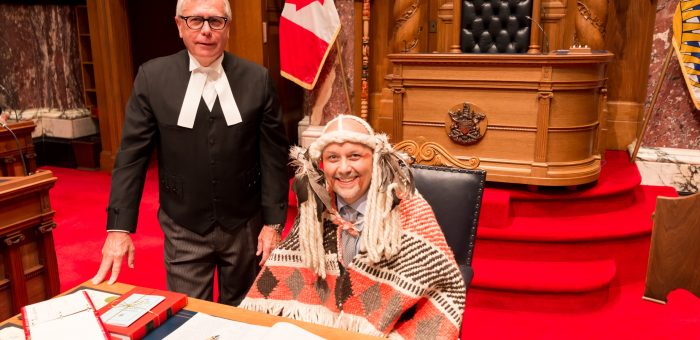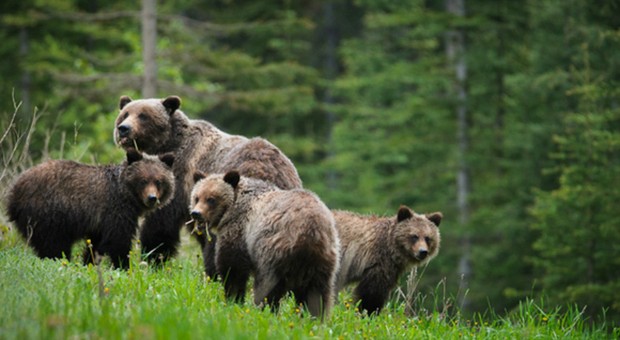Justice
Bill 9 — Miscellaneous Statutes (Minor Corrections) Amendment Act, 2017
Today in the legislature we debated Bill 9 — Miscellaneous Statutes (Minor Corrections) Amendment Act, 2017. This bill corrects a number of very minor errors in legislation that have been found over the years. Changes include things like the addition of a few commas, correcting spelling mistakes, including an ‘and’, replacing ‘whom’ with ‘who’ and numerous other trivial modifications.
Below are the text and video of my not to be taken too seriously comments on Bill 9.
Text of Speech
A. Weaver: I see that the Attorney General was very excited and wanted to close debate on this very important bill that corrects quite a number of small, minor issues over quite a number of statutes that have occurred over many, many years.
I take my place to speak, obviously, in favour. But I’d like to cover this in a little detail, because I think that it’s important that we get to the bottom of some of these changes to see how things are playing out. And I must admit these are not trivial changes in some cases.
As the hon. member for Prince George–Mackenzie was able to point out, this, of course, is…. Other tools of doing this…. We have an incredible legislative counsel working with the Attorney General’s office to keep our bills and statutes updated.
But as I was reading through this and as I was going through the various bills, checking why a comma was changed and so forth, it became clear to me that it’s not as easy to see why the changes occur as one might think.
For example, if we start with the very first change in this bill under Administrative Tribunal Statutes Amendment Act, 2015: “1 Section 70 (b) of the Administrative Tribunals Statutes Amendment Act, 2015, S.B.C. 2015, c. 10, as it amends section 12 (2) (d) of the Farm Practices Protection (Right to Farm) Act, R.S.B.C. 1996, c. 131, is amended by striking out ‘purposes’ and substituting ‘purpose.'” So rather than having purposes, there’s only one purpose.
But this is where it gets confusing. I went to section 10.3, where it said the following. In section 10, for the purposes of section 10.3, we’re directed to the Farm Practices Act. It says: “Stop a person whom the inspector….” I would have thought that the legislative drafters would have caught that it’s not “whom the inspector” but it’s “who the inspector,” because that is grammatically incorrect.
I’m not sure that, in fact, the Farm Practices Protection Act was changed in this. But I will point out that later in this, we do have a change in this act where the word “whom” is changed to “who.”
Just bear with me for a second. It’s a very complex and long bill here. Look in the Animal Health Act, No. 2 of the changes. It said: “Section 23 (1) (a) of the Animal Health Act, S.B.C. 2014, c. 16, is amended by striking out ‘whom’ and substituting ‘who.'” I agree with that — grammatically correct, very important to do.
But what I cannot believe was missed in this bill — and frankly, shame on government for missing this — in the change on section 1, it refers specifically to section 12.2(d) of the Farm Practices Protection (Right to Farm) Act, which says “stop a person whom the inspector respectfully believes is the person responsible for an animal or an animal product or by-product.” Shocking, reckless indifference to grammar.
I jest, as I’m sure you might imagine. The member Vancouver–West End isn’t sure whether I’m jesting or not, but there will be more of these to come. But it is kind of ironic as I was actually going through these, I did notice in the first reference, the “whom” wasn’t corrected to “who,” where in the very next thing, the “whom” was corrected to “who,” which is kind of interesting. But it gets complex.
When you go to the farm act again, and you’re coming in, it says “For the purpose of Section 10.3, respecting engagement and retention of specialists and consultants by the board,” the problem I’ve got here is that it refers to section 10, which was repealed. So it seems to me, in (1) that we’re correcting something that refers to another act, from “purposes” to “purpose,” which refers to another section that was repealed.
So I’m confused. I’m sure I’ll probe this in thorough detail during committee stage of this bill, as we try to get to the bottom of this critical missing section. I could just be in error.
There are many, many such changes here, most of which I’m sure have compelling reasons to actually support…. For example, the third one says…. In the Assessment Act, we’re striking out “sea going” and substituting “sea-going.” Now, that’s important because “sea going” could mean the sea is going, but “sea-going” implies sea-going. There’s a very important difference there, and I’m glad that this is picked out.
Also, in (4), it’s: “under the Canada Pension Plan.” But should you not know that the Canada Pension Plan needs to be highlighted…. We’re changing that to highlight Canada Pension Plan in italics, which is an important change for those who recognize that this needs to be brought forward and illustrated as significantly different from the rest.
We can go forward to the Budget Transparency and Accountability Act. There’s an “and” added here. It’s very important. Of course, I could see that. We’ve got some section issues. There’s a comma that was needed as well.
We’ve got “paragraphs” changing to “paragraph.” Heaven forbid we refer to “paragraphs” instead of just the “paragraph.”
There are many more. One of the more important ones is section 15 of the bill, where we talk about the Forensic Psychiatry Act. It’s critical. This is the Forensic Psychiatry Act. In today’s society, mental health issues are first and foremost in what we’re doing, and heaven forbid that we refer to an “inpatient” rather than “in-patient.” Now, I’m confused about that, and it’s causing me some mental anguish, particularly as it’s in the Forensic Psychiatry Act.
When I look it up in the Merriam-Webster dictionary, “inpatient” is “inpatient.” I know it sounds like “impatient,” which I’m sure the members are right now, as I’m speaking, but “inpatient” seems to be okay.
Interjection.
A. Weaver: The member for Surrey–White Rock suggests that I do not jest when I say that.
There are many. The Great Bear Rainforest Act, an act brought in very recently. Instead of now saying “new-non GBR, it’s “new non-GBR.” Not sure quite what the change is in that…. Oh, sorry. The hyphen was in the wrong place. It was “new-non GBR,” and now it’s “new non-GBR.” Another important change.
I could go on. I could on with the many, many changes.
Interjection.
A. Weaver: Oh, the member for Chilliwack-Kent would like me to go on.
I want to come to the schedules at the back, where the changes are. There are so many of these commas and others, which are important, obviously. We come to the schedules, and these are some of the most dramatic changes that need to be done.
On page 10 of this bill, it says “in so far” as opposed to “insofar” with no spaces. It’s replacing that in so many places, in 12 different bills. Sloppiness, going back to the 1990s. Heaven forbid we look at the error.
It was made in all the bills. The Arbitration Act, 1996. The Cooperative Association Act, 1999. The Creston Valley Wildlife Act, 1996. The Frustrated Contract Act, 1996. I didn’t know such an act existed. The Interpretation Act, 1996. The labour relations code, 1996. My good friends the NDP here shouldn’t have made the mistake in that one. The Land Title Act, 1996. The Ministry of Provincial Secretary and Government Services Act, 1996. The Offence Act, 1996. The Railway Act, 1996. The Securities Transfer Act, 2007. This error clearly, while originating in the decadent eras of the 1990s, perpetuated through sequential Liberal governments and was not corrected in the 2007 bill, brought in as the Securities Transfer Act. I’m so glad it’s being changed. Grammaticists and spell-checkers around the world are celebrating today.
On Schedule 2. I must admit that I don’t understand this. I guess I do. In 13 — 13 no less — bills, most of which were done by the B.C. Liberals, “mail box” is corrected to “mailbox” with no space. Now, that’s important. It is not “male box.” They’re not saying “male box.” I get why some males should be in a box. They’re saying “mail box,” being replaced by “mailbox,” no space.
Now, I don’t understand that one. I thought “mail box” was pretty clear, that it’s a mail box, but apparently not. So I do appreciate these changes, and I thank government from the bottom of my heart for bringing these changes forward.
We also have, in Schedule 3, “merit based processes” being corrected to “merit-based processes” in many, many places as well. And finally, Schedule 4 on this bill, at the end….
Interjection.
A. Weaver: The member for Cariboo-Chilcotin is taking such an aggrieved point of view about this bill. Oh, my goodness.
Interjections.
A. Weaver: Cariboo North. I’m sorry. I’m looking forward to her standing and speaking passionately in support of this, as I’m about to head to Education estimates in about one minute.
The final change that I think needs to be celebrated here today is “self propelled” being corrected to “self-propelled.”
With that, I will self-propel myself back into my seat.
Video of Speech
Our statement on the 10th anniversary of UN Declaration on the Rights of Indigenous Peoples
B.C. Green caucus statement on the 10th anniversary of UN Declaration on the Rights of Indigenous Peoples
For immediate release
September 13, 2017
VICTORIA, B.C. – Andrew Weaver, leader of the B.C. Green caucus, and Adam Olsen, B.C. Green caucus spokesperson for the Ministry of Indigenous Relations and Reconciliation, issued the following statement in recognition of the tenth anniversary of the United Nations Declaration on the Rights of Indigenous People (UNDRIP).
“UNDRIP is a landmark acknowledgement of the rights of Indigenous people across the world,” Weaver said.
“I am proud that the commitment to adopt UNDRIP is a foundational piece of our Confidence and Supply Agreement with the B.C. NDP and our caucus looks forward to supporting measures to establish a true government-to-government relationship with B.C.’s Indigenous peoples.”
“Today is a day to celebrate the fact that we have finally reached the point where we are beyond debating whether the minimum standards of UNDRIP should be endorsed,” Olsen said.
“By endorsing UNDRIP and pledging to work together to implement it, we are turning the page on denial of Indigenous peoples and their rights. We must now work together, in partnership, to identify how to implement and operationalize these standards. Doing so will require honesty about our deep and recent history of colonization, with all of the injustices and wrongs that term entails.
“Through working together we can show our children and grandchildren how we can at once create a more just society, address historic wrongs, and build prosperity for the future.”
-30-
Media contact
Jillian Oliver, Press Secretary
+1 778-650-0597 | jillian.oliver@leg.bc.ca
My statement on MLA Darryl Plecas becoming Speaker
Today the legislature resumed sitting and our first order of business was to elect a speaker. I am absolutely thrilled that Dr. Darryl Plecas, the MLA from Abbotsford South was duly elected.
I got to know Darryl over the last few years and must say I cannot imagine a better person for the position. He is a principled man of exceptional ethics and high moral standards.
Shortly after an article appeared in Abbotsford News on August 4th, wherein Darryl Plecas confirmed he had threatened to resign if Christy Clark stayed on as premier, I phoned him up and and asked if he would be willing to have his name stand as speaker. We had a long conversation and I certainly got the sense that he was interested. I was delighted to see him follow through on that interest today.
Tradition in the house is for both government and official opposition house leaders to drag the speaker to the chair. This tradition embodies the apparent reluctance of the newly elected speaker to take on the role. A humerous moment occurred when Liberal house leader Mike de Jong whispered to Darryl Plecas and Mike Farnworth (directly in front of where I was sitting) “In this case even token resistance will be taken as disingenuous.”
But humour ended there. The BC Liberals displayed a remarkable lack of grace and acted in a manner most unbecoming of MLAs. BC Liberal MLAs were instructed not to clap as the Speaker moved to the chair. This form of passive aggressive bullying has no business in the chamber and frankly, I think the Liberal caucus should be ashamed of themselves.
To make matters even worse, and in what can only be described as a classless act, the Interim Leader of the BC Liberals, Rich Coleman broke tradition and instead of offering his congratulations, gave the Speaker a lecture:
R. Coleman: The role of Speaker is fundamental to our parliamentary democracy. As Speaker you are in charge of ensuring that the traditions of this House are respected. As Speaker you’re responsible for ensuring that the majority and the minority are equally heard in the chamber. As Speaker your job is to protect the integrity of the institution and always to act honourably.
There will be times when the Legislature becomes raucous, and the Speaker must have the fortitude to make decisions guided in this chamber by things that happened over the last hundred years. Mr. Speaker, we hope you live up to those standards.
Compare that to the congratulatory remarks delivered by Premier Horgan:
Hon. J. Horgan: Hon. Speaker, I rise to offer my congratulations to you as the Speaker of the people’s House. The people in their wisdom sent and an equal number of members from two political parties and a third party to support the work of the great province that we happen to be living in. I am so delighted that you’ve taken up the challenge of keeping us honest, keeping us fair and keeping us on course.
Of course, for the people of B.C., this is not about partisanship. This is about a new government and a new opportunity. I fully expect those on the other side of the House to keep us accountable, and I fully expect members on this side of the House to be respectful to the questions asked and, most importantly, respectful to you and the office that you hold.
I can’t tell you how happy I am to look forward to working with you over the next number of years to make B.C. better.
With that, Hon. Speaker, the best of luck to you. You have our full support. I look forward to working with you in our House for all of the interests that British Columbians want us to achieve in the days and years ahead.
Below is the statement that I released concerning the appointment of a Speaker.
Media Statement
Weaver statement on MLA Darryl Plecas becoming Speaker
For immediate release
September 8, 2017
VICTORIA, B.C. – Andrew Weaver, leader of the B.C. Green Party, issued the following statement in response to Darryl Plecas becoming Speaker.
“I am delighted to congratulate Darryl, who has been declared Speaker of the Legislative Assembly,” Weaver said.
“Darryl is known by his colleagues in the Legislature as a person of exceptional ethics and high moral standards. He will undoubtedly serve with dignity and honour as Speaker of this House.
“Darryl’s willingness to stand for Speaker is an encouraging sign that the MLAs of all parties will be able to work together in a productive, collaborative session. We have an historic opportunity to work across party lines to advance good public policy that serves the interests of British Columbians. I look forward to finally getting on with the business of the Legislature to do just that.”
-30-
Media contact
Jillian Oliver, Press Secretary
+1 778-650-0597 | jillian.oliver@leg.bc.ca
Calling for independent inquiry into Port Mann bridge management
Today we issued a statement calling for an independent inquiry into the management and construction of the Port Mann bridge. This was done in response to an investigative CBC report that appeared this morning.
Below I reproduce the statement.
Media Statement
B.C. Greens call for independent inquiry into Port Mann bridge management
For immediate release
September 7, 2017
VANCOUVER, B.C. – Andrew Weaver and Adam Olsen today called for an independent review of the Port Mann bridge spending in response to news that a CBC investigation uncovered allegations of at least $150 million in misspent funds.
“The allegations that at least $150 million of taxpayer money has been misspent by the Liberal government on this project are deeply troubling,” Weaver said.
“British Columbians deserve answers. A public inquiry into the management of this project must be conducted to determine whether taxpayer interests have been adequately protected.”
Yesterday, Olsen was appointed the B.C. Green caucus spokesperson for transportation.
“It is essential that major capital projects are providing the best value for money for British Columbians,” continued Olsen.
“Taxpayers deserve to know whether their money is being well managed. The allegations published today raise serious questions as to whether this was the case with the Port Mann bridge. We must ensure accountability and transparency so that transportation is managed in the most efficient means possible.”
-30-
Media contact
Jillian Oliver, Press Secretary
+1 778-650-0597 | jillian.oliver@leg.bc.ca
Political stunts and political spin — the confusing tale of the government’s inept grizzly bear policy
Today the BC NDP claimed to set the stage for banning trophy hunting of grizzly bears in British Columbia. In what can only be described as a political stunt, the BC NDP announced that “effective Nov. 30, 2017, the British Columbia government will end grizzly bear trophy hunting throughout the province.” They further proclaimed “while the trophy hunt will end, hunting for meat will be allowed to continue.”
In response to their announcement I issued a statement, reproduced below.
As you will see, I am very supportive of the fact that the B.C. NDP are respecting the wishes of the Coastal First Nations by placing a moratorium on the hunting of grizzlies in the Great Bear Rainforest. Readers of this website will know that I called for this back in February, 2014 (3 1/2 years ago). However, during the election campaign I pointed out that the B.C. NDP appeared to be trying to have their cake and eat it too when it came to the grizzly hunt. They told the hunting community one thing and the environmental community another.
Today’s announcement will not end grizzly bear hunting in B.C., as many environmental groups have advocated for.
In addition, this announcement will create a system in which not all of the animal will be harvested – resident hunters will no longer be allowed to possess the hair, head and hide of grizzlies. This will be viewed as wasteful by the resident hunting community.
Foreign hunters will still be able to shoot grizzlies in British Columbia, take a picture of themselves standing over the dead beast, and head back home without harvesting any of the animal.
What’s remarkable is that when I introduced legislation in the Spring of 2017 targeted at foreign trophy hunters the BC NDP did not support it. Now, they introduce a mishmash approach that makes little sense.
I’m not sure how this will appease the concerns of anyone. It appears to me that the NDP were trying to play to environmental voters in the election campaign without thinking through their policies. What we really need in BC is science-based approach to wildlife management, not a populist approach to species management.
Media Release
Weaver statement on government’s intention to end the grizzly bear trophy hunt
For immediate release
August 14, 2017
VICTORIA, B.C. – Andrew Weaver, leader of the B.C. Green caucus, responded to today’s news regarding grizzly bear hunting in British Columbia. Weaver has long advocated for action on this issue.
“I am encouraged that the B.C. NDP are respecting the wishes of the Coastal First Nations by placing a moratorium on the hunting of grizzlies in the Great Bear Rainforest,” says Weaver.
Weaver further cautions “During the election campaign I pointed out that the B.C. NDP appeared to be trying to have their cake and eat it too when it came to the grizzly hunt. They told the hunting community one thing and the environmental community another.”
Today’s announcement will not end grizzly bear hunting in B.C., as many environmental groups have advocated for.
In addition, this announcement will create a system in which not all of the animal will be harvested – resident hunters will no longer be allowed to possess the hair, head and hide of grizzlies. This will be viewed as wasteful by the resident hunting community.
In addition, foreign hunters will still be able to shoot grizzlies in British Columbia, take a picture of themselves standing over the dead beast, and head back home without harvesting any of the animal.
Weaver adds “I’m not sure how this will appease the concerns of anyone. It appears to me that the NDP were trying to play to environmental voters in the election campaign without thinking through their policies.
“What we really need in BC is science-based approach to wildlife management, not a populist approach to species management.
“B.C. is one of the last strongholds of grizzlies in North America. There are a range of issues that affect the health of grizzly bear populations. These include the effects of climate change on essential salmon and huckleberry stocks, as well as road kill rates and poaching incidents. We must focus on broader wildlife preservation if we are serious about conservation and the protection of grizzlies and other species in this province.
“B.C. and Alberta are the only provinces without Endangered Species legislation. I will work with the government to ensure the introduction of species at risk legislation is advanced in the near future,” says Weaver.
-30-
Media contact
Jillian Oliver, Press Secretary
+1 778-650-0597
jillian.oliver@leg.bc.ca








